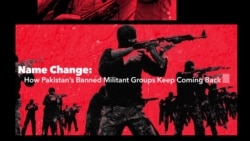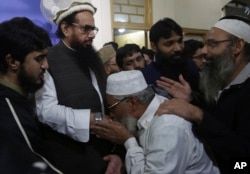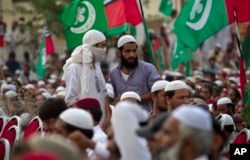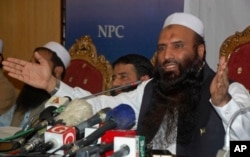Changing one's name in Pakistan is a daunting and lengthy legal procedure that requires extensive paperwork.
Surprisingly, that is not the case with militant groups that get banned by the government. In the past two decades, several groups accused of carrying out terror attacks have avoided a crackdown by changing their names.
Islamist cleric Hafiz Saeed, a U.S.-designated terrorist who allegedly was the mastermind of the 2008 Mumbai attacks that killed 160 people, is perhaps the most prominent leader accused of the tactic.
Saeed lives freely in Lahore, despite having a $10 million U.S. bounty on him since 2012. His Lashar-e-Taiba (LeT) group also has been designated a terrorist outfit by the United Nations, Britain, Russia and the European Union. But he has evaded a ban in Pakistan on LeT by creating multiple other organizations that critics say are merely fronts for the original terrorist group.
LeT was formed in the 1980s with a vision to liberate Indian-administered Kashmir and to eventually merge it with Pakistan. The government of Pakistan banned LeT in 2002.
Saeed later renamed LeT as Jamaat-ud-Dawa (JuD), and its charity subsidiary Falah-e-Insaniat Foundation (FIF). Both JuD and FIF are placed on U.S. and U.N. terror watch lists.
The resurfacing of several terror factions over the years has led regional experts to question the government's willingness to hold such groups accountable.
"Banned organizations are not allowed to resume activities after changing names, according to the law," Zahid Hussain, a security expert, told VOA.
"Nevertheless, almost all of the banned outfits are working in Pakistan. It appears that the state and the government are not serious about stopping them. They only place them on a terror watch list after facing increased international pressure," he added. "We have several such examples, such as JuD, Jaish-e-Muhammad and Sipah-e-Sahaba Pakistan."
Jaish-e-Mohammad (JeM), an extremist group proponent of liberation of Indian-administered Kashmir, operated under a new name, Tehreek-ul-Furqan, after it was banned in 2002.
Harkat-ul-Mujahideen, a U.N.-designated terror group, rebranded itself as Harkat-ul-Ansar in 1993 following a ban. Its leader, Fazlur Rehman Khalil, lives openly in the Pakistani capital.
Sipah-e-Sahaba Pakistan (SSP), a radical group that is blamed for deadly attacks against the country's minority Shiite Muslims, was banned multiple times by the government, only to reinvent itself as Millat-e-Islamia Pakistan (MIP) and Alh-e-Sunnat-Wal-Jamaat (ASWJ).
Despite these examples, Pakistan's minister of state for interior affairs, Talal Chaudhry, maintains that no banned terror groups are allowed to operate in any capacity.
"The recent example is of Milli Muslim League. Pakistan's interior ministry last year wrote a letter to the country's election commission and stated MML is the front organization for Jamaat-ud-Dawa and should not be registered at the electoral body," Chaudhry told VOA.
"There are scores of organizations who are placed under Pakistan's terror watch list to make sure they do not operate in any way."
Many outside analysts say the government is willfully ignoring the problem because authorities believe the groups somehow promote the government's interests in the region.
"Pakistan has the capacity to stop these groups from changing names and operating freely, but it simply doesn't have the desire to do so," said Michael Kugelman, deputy director of the Asia Program at Washington's Wilson Center.
"That's because Pakistan believes it has a stronger interest in letting these groups continue to operate, with different names, than in waging a full-scale crackdown," he added.
'Alarming' problem
While the problem is not new, it may be worsening.
Pakistan's general elections are scheduled to happen before mid-August, and observers say more radical groups are trying to rebrand themselves to enter national politics.
Milli Muslim League was created in August 2017 and is considered to be the political wing for JuD. The United States last month banned the organization, declaring its leadership as "terrorists."
Similarly, Alh-e-Sunnat-Wal-Jamaat, the front for Sipah-e-Sahaba Pakistan, aims to contest the upcoming general elections.
Political experts see the emergence of militants-turned-political parties as alarming and say they should not be allowed to join mainstream politics.
"The deep state of Pakistan is supporting the banned outfits as it has done in the past. This game should be stopped and the government should show its commitment and sincerity in disarming these groups and not to allow them to enter into politics," defense analyst Ahmed Rashid told VOA.
Even if they run, there is no guarantee the militants' parties will be able to draw much support at the ballot.
"The emergence of new hard-line religious political parties is certainly alarming, particularly as some are affiliated with actual terror groups," said Kugelman. "The good news is that religious political parties rarely do well at the polls in Pakistan.
"However, the reason for concern lies less with their electoral prospects, which are limited, and more with the fact that mainstreaming them brings them a semblance of legitimacy that only emboldens them and makes them stronger."
International pressure
Pakistan has been under growing international pressure for its inability to crack down on Saeed and other terror groups that resurface with new identities.
When Saeed was freed in November 2017 after 11 months of house arrest, the U.S. warned Pakistan of consequences.
Later, the U.S., along with Britain, France and Germany, introduced a motion against Pakistan with the Financial Action Task Force (FATF), a global financial watchdog that monitors terror financing and money laundering around the world. The motion sought to place the country on the FATF list.
According to a decision taken at FATF's meeting in February, Pakistan will be placed on FATF's terror watch list in June this year.
Jinne Hassan contributed to this article.









